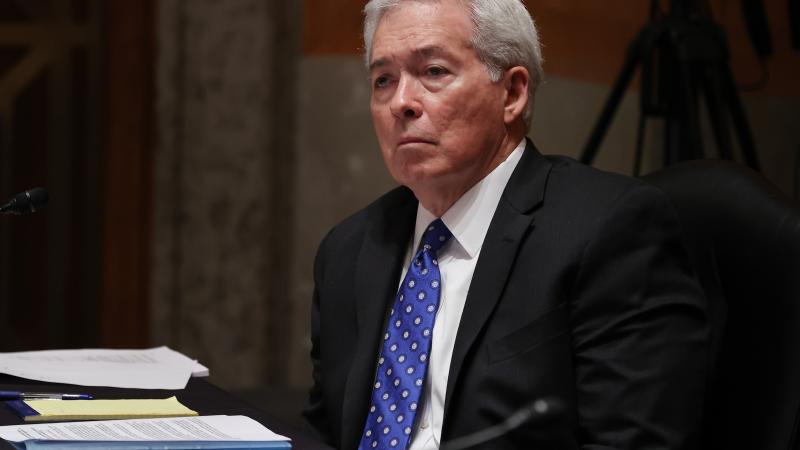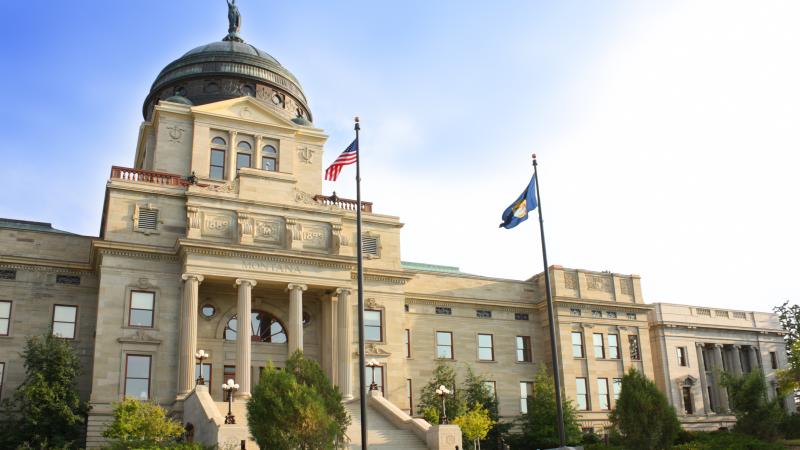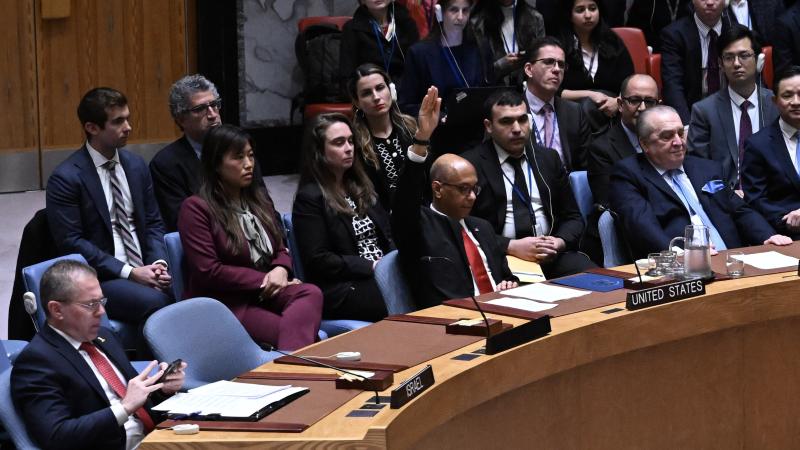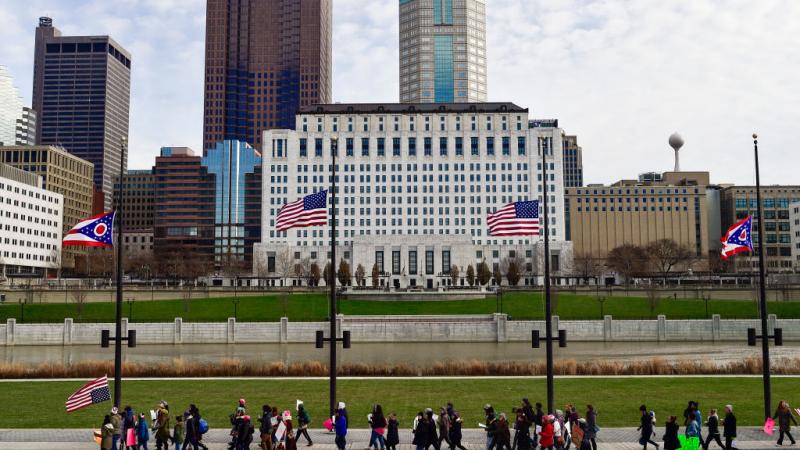'Tsunami of litigation'? SCOTUS considers upending legal shield for administrative state
"Everyday Americans" like single mother Michelle Cochran "find themselves trapped before an unconstitutional agency decisionmaker" unless high court affirms district courts have jurisdiction to block unlawful proceedings, her lawyer argues.
Federal agencies can "trap" businesses and individuals for years in proceedings before administrative law judges (ALJs) who work for the agencies, rarely rule against them and can't be removed by the president, constituting "here-and-now constitutional injuries," according to lawyers for these targets.
Nonlethal weapons supplier Axon Enterprises and certified public accountant Michelle Cochran want the right to challenge the constitutionality of Federal Trade Commission and Securities & Exchange Commission ALJs in real courts, before the expense and emotional drag compels them to settle regardless of their guilt or the legitimacy of the proceedings.
At oral arguments Monday, Supreme Court justices expressed dueling fears. Opening federal district courts to administrative targets could unleash a "tsunami of litigation," Justice Brett Kavanaugh said, while Justice Ketanji Brown Jackson feared judicial interference in agency proceedings.
Explicitly shutting out Axon and Cochran could violate the plain language of federal law, however, Justice Neil Gorsuch suggested.
Justices mulled how to interpret their own recent precedents, including a 2010 ruling known as Free Enterprise Fund that invalidated the two-layer for-cause removal protections for the SEC's ALJs.
Citing the 1994 ruling known as Thunder Basin, the court said it presumes Congress doesn't intend to preclude the jurisdiction of federal courts if that could "foreclose all meaningful judicial review," if a suit is "wholly collateral" to a law authorizing specific appeals provisions, and if the claims are "outside the agency's expertise."
The FTC challenge provides a "rare opportunity" for the high court to rein in the agency's "yearslong abuse of due process and its practice of bringing dubious administrative lawsuits that would never pass muster in federal court," Baker Botts partner Will Lavery wrote in Law.com.
Winning their proceedings would be beside the point for Axon and single mother Cochran because it wouldn't "restore the time, resources, and energy consumed in the allegedly unlawful process," Columbia law professor Ronald Mann wrote for Scotusblog.
Section 1331 of U.S. Code chapter 28 gives district courts "original jurisdiction of all civil actions arising under the Constitution," former Solicitor General Paul Clement argued for Axon. Congress simply gave federal appeals courts "additional jurisdiction" to review challenges to FTC cease-and-desist orders.
"The nature of the claims here are structural claims" about the constitutionality of the ALJs, Clement told Justice Clarence Thomas. "They go to the very existence of the agency" and are "logically anterior" to the antitrust proceeding the FTC launched against Axon. The removal protections are also from a different law the FTC can't touch, he noted.
Justice Sonia Sotomayor warned that "almost any administrative process could be called collateral on constitutional issues." Clement seems to be "saying this is unfair because I have to go through the process, but going through the process is what due process is all about," she said: The lawyer is asking for "another card in your pocket that you can play if you lose."
Chief Justice John Roberts said it would be "hard to draw" a line between structural constitutional and "particular due process" claims for jurisdictional purposes. If Roberts is concerned about "edge cases," Clement responded, the court should "err on the side of giving the citizen early access to the courts."
Free Enterprise Fund hinged on the proceeding being in the "investigative stage," Kavanaugh said. But Axon is suffering the same problem, Clement responded: It would have to "precipitate a contempt sanction" to get judicial review, a "bet the farm" scenario.
The "overwhelming majority" of targets settle — precluding the FTC Act's federal appeals process — because the FTC "essentially won't accept a settlement unless you forego your appellate rights," he told Thomas. That's the same pattern in federal courts, Sotomayor responded: Prosecutors typically require appeals waivers for plea bargains.
"What am I missing here?" asked Gorsuch, noting section 1331 and the FTC Act don't appear to be in conflict, especially since the agency hasn't issued a cease-and-desist against Axon. Pressed about this later by Jackson, Clement said the FTC issued the C&D "the afternoon" after Axon filed its lawsuit to preempt the action.
Unlike Axon, Cochran's case shows the importance of access to federal courts "for everyday Americans who find themselves trapped before an unconstitutional agency decisionmaker," her lawyer Gregory Garre told the justices.
The former solicitor general confirmed to Thomas there was no "meaningful difference" factually between the two cases except that the SEC Act has a "savings clause ... in which Congress made clear that it was not displacing traditional rights or remedies."
As with the FTC, more than 90% of SEC targets settle "because the individuals just frankly can't endure the years of [in-house] proceedings," a practice that goes back to the Dodd-Frank Act in 2010, Garre said.
Jackson worried that reading too much into congressional silence on jurisdiction for federal district courts could not only "undermine congressional intent about the finality of agency action" as the condition for appellate review, but also raise unnecessary constitutional questions that the high court seeks to avoid.
Garre emphasized that congressional authorization was based on "the record that had been developed" in an agency proceeding.
An appeals court can't provide the relief Cochran seeks, which is "an injunction against a proceeding before unconstitutional ALJs" rather than overturning the result of that proceeding, said Garre, arguing that she is "suffering this injury wholly apart from whether or not we win or lose at the end of the day before the agency."
The courts have repeatedly rejected the idea that they can routinely intervene in ongoing regulatory proceedings, according to Deputy Solicitor General Malcolm Stewart, who represents the government in both cases.
While courts have long granted non-statutory "equitable relief" to those who would otherwise have "no access to judicial review of constitutional claims," he said, "that authority has never been unlimited" and was expressly rejected in a shipbuilder's constitutional challenge to National Labor Relations Board jurisdiction.
When Stewart invoked a section of the Administrative Procedure Act that provides for review of "preliminary, procedural, or intermediate" agency actions at the same time final agency action is reviewed, the well-known textualist Gorsuch interrupted.
"There's no withdrawal jurisdiction anywhere" in the FTC Act or section 1331, and Stewart looks to "the APA to discern that," the justice said, asking him to provide "the agency action that would implicate" that APA section. Justice Elena Kagan was similarly confused as to why Stewart invoked the APA.
Roberts asked Stewart to explain how the court's 2010 ruling, which the chief justice wrote, is not a "pretty insurmountable barrier to your argument ... the grant of judicial jurisdiction in other forums wouldn't be read as an implied removal of jurisdiction in [Section] 1331."
Kagan put Stewart on the spot for not mentioning the court's 1994 precedent on congressional intent, which it has used to decide similar cases three times, until 50 pages into his brief. Both she and Jackson questioned whether the government actually believes Thunder Basin supports its case.
The chief justice seemed skeptical of Stewart's argument that the SEC itself could consider Cochran's constitutional challenge. The lawyer said the agency warned in a 2015 opinion that making ALJs "removable at will ... would impair their actual or apparent impartiality."
"Was their position a surprise?" Roberts responded, further prodding Stewart to explain how that 2015 opinion was different from writing a brief in district court "defending the structure of the agency," as Cochran seeks.















